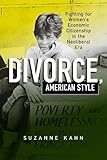Divorce, American Style : Fighting for Women's Economic Citizenship in the Neoliberal Era / Suzanne Kahn.
Material type: TextSeries: Politics and Culture in Modern AmericaPublisher: Philadelphia : University of Pennsylvania Press, [2021]Copyright date: ©2021Description: 1 online resource (344 p.) : 10 illusContent type:
TextSeries: Politics and Culture in Modern AmericaPublisher: Philadelphia : University of Pennsylvania Press, [2021]Copyright date: ©2021Description: 1 online resource (344 p.) : 10 illusContent type: - 9780812297881
- Divorce -- Law and legislation -- United States -- History -- 20th century
- Women social reformers -- United States -- History -- 20th century
- Women -- Legal status, laws, etc -- United States -- History -- 20th century
- Women -- United States -- Economic conditions -- 20th century
- Women's rights -- United States -- History -- 20th century
- HISTORY / United States / 20th Century
- American History
- American Studies
- Gender Studies
- Women's Studies
- 970.980
- E
- online - DeGruyter
| Item type | Current library | Call number | URL | Status | Notes | Barcode | |
|---|---|---|---|---|---|---|---|
 eBook
eBook
|
Biblioteca "Angelicum" Pont. Univ. S.Tommaso d'Aquino Nuvola online | online - DeGruyter (Browse shelf(Opens below)) | Online access | Not for loan (Accesso limitato) | Accesso per gli utenti autorizzati / Access for authorized users | (dgr)9780812297881 |
Browsing Biblioteca "Angelicum" Pont. Univ. S.Tommaso d'Aquino shelves, Shelving location: Nuvola online Close shelf browser (Hides shelf browser)

|

|

|

|

|

|

|
||
| online - DeGruyter The Fallen Veil : A Literary and Cultural History of the Photographic Nude in Nineteenth-Century France / | online - DeGruyter Survival : A Theological-Political Genealogy / | online - DeGruyter Iberian Moorings : Al-Andalus, Sefarad, and the Tropes of Exceptionalism / | online - DeGruyter Divorce, American Style : Fighting for Women's Economic Citizenship in the Neoliberal Era / | online - DeGruyter Fighting for the Higher Law : Black and White Transcendentalists Against Slavery / | online - DeGruyter Star Territory : Printing the Universe in Nineteenth-Century America / | online - DeGruyter The Belief in Intuition : Individuality and Authority in Henri Bergson and Max Scheler / |
Frontmatter -- CONTENTS -- Introduction. Divorce, 1970s Style -- PART I. THE DIVORCE REVOLUTION -- Chapter 1. From Alimony Drones to Breeding Cows: Women and the Divorce Law Revolution -- Chapter 2. From the Altar to the Grave: The Beginnings of the Feminist Divorce Reform Movement -- PART II. A GALAXY OF LAWS -- Chapter 3. Partners or Parasites? Class, Race, and Credit Rights -- Chapter 4. The Privileges of Marriage: Divorced Women and Selective Entitlements to Health Care -- Chapter 5. Marriage as Work, Marriage as Partnership: Divorced Women’s Fight for Social Security -- Chapter 6. “How You Lose Money by Being a Woman”: Divorce in an Age of Proliferating Retirement Savings Options -- Chapter 7. An Expensive Endurance Test: Compromising Toward Success in the 1980s -- PART III. STABLE DIVORCE RATES AND UNSTABLE POLITICS -- Chapter 8. “Responsibility, Equity; Not Cruelty”: Changing Venues for Feminist Divorce Reformers -- Chapter 9. “Saving the Next Generation”: The Changing Politics of Divorce -- Conclusion. No- Fault Divorce in a Morality- Based Welfare System -- Notes -- Index -- Acknowledgments
restricted access online access with authorization star
http://purl.org/coar/access_right/c_16ec
In the 1970s, the divorce rate in the United States doubled, and longtime homemakers suddenly found themselves at risk of poverty, not only because their husband's job was their sole source of income, but also because their insurance, retirement, and credit worthiness were all tied to their spouse's employment. Divorce, American Style examines how newly divorced women and policymakers responded to the crisis that rising divorce rates created for American society.Suzanne Kahn shows that, ironically, rising divorce rates led to policies that actually strengthened the social insurance system's use of marriage to determine eligibility for benefits. Large numbers of newly divorced women quickly realized their invisibility within the American welfare state, which did not distribute benefits to most women directly but rather through their husbands. These newly divorced women organized themselves into a political force, and they were remarkably successful in securing legislation designed to address divorced women's needs. But this required significant compromise with policymakers, and these new laws specifically rewarded intact marriages, providing more robust benefits to women in longer marriages. These incentives remain in place today. Indeed, in the thirty years since this legislative compromise, activists' efforts to grapple with the legal system created out of this crisis have affected such high-profile debates as the fight over the Affordable Care Act and the battle for marriage equality.Divorce, American Style contests the frequent claim that marriage has become a more flexible legal status over time. Enduring ideas about marriage and the family continue to have a powerful effect on the structure of a wide range of social programs in the United States.
Mode of access: Internet via World Wide Web.
In English.
Description based on online resource; title from PDF title page (publisher's Web site, viewed 01. Dez 2022)


